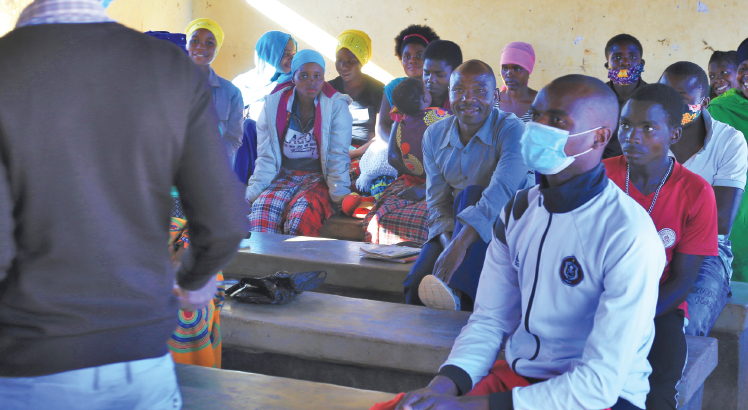Nearby a make-shift mobile money kiosk at Mitundu Market on the outskirts of Lilongwe, stands a middle-aged man.
At first glance, one may not clearly figure out his intentions as he curiously gazes at the thinning queue of anxious money depositors and withdrawers.
When the queue melts away, he nervously tramps towards the kiosk’s operator and, while handing over his tiny black mobile phone handset, he asks, almost inaudibly: “Zowerenga zimandivuta, ndithandizeni kutulutsa wani sausande faifi handede (I have reading deficiencies, help me cash out K1 500).”
A password is, in any discernible sense, supposed to be a secrecy. Its leakage, mobile money service providers have been warning, may result in one being swindled. However, under his circumstances, the man’s options are limited, and he reveals his password to the operator.
After the transaction, the man pins the three banknotes in his side pocket and calmly walks away. His face, radiant with relief.
Countrywide, there are thousands of people in this situation—adult men and women trapped in the shackles of illiteracy, which government and its partners have, for 75 years, been trying to break down. The results have been a mixture of setbacks, uncertainty and success.
Learners in a classroom
Illiterate figures in a country of about 19 million people do not inspire any hope of a better future or any semblance of it any time soon.
The 2018 Malawi Housing Population Census revealed that there were 15 million people aged five years and older. Out of this, 4.7 million were illiterate. That represented a 0.9 increase from the 2008 survey which pegged the number of illiterate Malawians at 3.8 million.
And the consequences of such a growing number are dire, National Planning Commission (NPC), a frontier that is charting the nation’s paths for economic and development success, weighs in.
“One reason Malawi is grappling with underdevelopment is the country’s general low human capacity. Various factors have contributed to this, including poor access to quality education, at the early childhood, primary, secondary and tertiary level; and skills mismatch.
“This has affected the social and economic growth of the country because low human capacity means the country lacks an adequate pool of human resources to direct how other resources are put into productive use to attain desired development outcomes,” said Thom Khanje, public relations and communications manager.
Setbacks and constraints
Government and development partners have for the past five years targeted to enroll 300 000 into adult literacy classes annually but that has been far-fetched. If anything, the enrollment has significantly dropped over that period.
National Centre for Literacy and Adult Education (Naclae) annual reports show that in 2016/17, around 150 360 enrolled. The following year, there was a record 170 403 enrolment. In 2018/19, a total of 141 756 adults enrolled but 2020 recorded the lowest at 17 643.
The centre blamed the decline on “several reasons including the impact of Covid-19 as most classes were suspended”.
Tracking through the national budget reveals funding deficiencies facing adult learning and education (ALE). In the past five years funding fell from K309 million in the 2017/18 financial plan to about K104 million in 2020/21.
This, on average, is 0.16 percent of the total education sector budget, a far cry from the Belem Framework of Action minimum benchmark which recommends a three percent allocation.
ALE is also haunted by a shortage of learning materials. The sector only has 60 000 Chichewa learning books when demand is at 300 000 representing 80 percent shortfall. There are 12 600 English learner books across the country against a requirement of 130 640, representing 90 percent deficit.
Ministry of Gender spokesperson Fred Simwaka, in an interview, acknowledged the challenges, which he blamed on poor funding.
“We are doing our best to tackle illiteracy among the adults. Shortage of resources is our biggest drawback. What we need are more investors because the government cannot manage to bankroll the sector,” he said.
The way forward
While the Ministry of Gender and other players nail ALE on training adults to read, write and count, DVV International, which has invested massively in sustainable adult education structures, wants the focus to be broadened.
David Harrington, its director for Southern Africa said: “Historically, ALE in Malawi has been viewed in a very narrow way as just literacy and numeracy (as sukulu za kwacha). We need to move away from this old-fashioned way of thinking.
“Literacy and numeracy are foundational skills but they need to be linked to practical knowledge and skills that people need and use in their daily lives.”
To redesign the ALE focus, DVV International says it is working with government and civil society organisations in the country to promote integrated adult education.
“Through this approach, participants learn knowledge and skills in areas they need such as agriculture and entrepreneurship while simultaneously learning literacy and numeracy,” Harrington said.
According to the World Bank, smallholder farmers account for 80 percent of the country’s population but statistics show that 60 percent of them are illiterate. Extending the ALE reach to agriculture, as DVV International is bidding, could spur production and with that, the economy which is agro-based.
Government hopes for ALE success are tagged on the five-year policy which was rolled out in 2020 and the National Adult Literacy and Education which has just been formulated.
With these blueprints which expire in 2026, government and partners are bidding to enhance coordination and collaboration; access, relevance and quality; visibility and awareness and resource mobilisation.
Academic expert Limbani Nsapato, however, observes that without political will and coordination, implementation of such policies turn out to be a slippery task.
“Literacy programmes cut across several ministries including ministries of agriculture, labour, education etc, but there is little cooperation and political will at higher level of these ministries, which makes it difficult to adequately implement policies and strategies,” he wrote in his paper titled ‘State of Adult Learning and Education in Malawi’.
The United Nations championed Sustainable Development Goal number four challenges countries to “ensure inclusive and equitable quality education and promote life-long learning opportunities for all”
Target 4.6 of the goal explicitly tackles ALE, asking its member countries to “by 2030 ensure that all youth and a substantial proportion of adults, both men and women, achieve literacy and numeracy.”
Amid the challenges haunting ALE programmes, doubts over the country’s capacity might, for much longer, hang in the air.
It is now up to government, at this hinge point of history, to demonstrate that its policies and strategies are more than just printed words.
The post Bumpy road to adult illiteracy elimination appeared first on The Nation Online.
 Moni Malawi
Moni Malawi 

